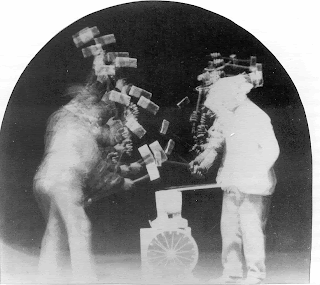One of the thematic contrasts that recur in my show and in my thinking is that of the organic and the mechanical. The material wonders of industrial technology and mass production are ubiquitous and obvious, as is the praise for these pervasive systems but - our species seems to be losing touch with the natural and the organic and "nature deficit disorder" is on the rise. Outdoors, in the green woods we are confronted with the "chaos" of unsystematic Nature and must rely upon our own creativity and spontaneous action - there is no script.
We regularly use machine metaphors to refer to the ideal in human performance and the digital world lures us into disdain for our bodies because they are never as "perfect" as our avatar - our bodies age and smell and this reminds us uncomfortably of our animality. Like D-503 in Zamyatin's We, our lives are increasingly lived within the comfortable confines of a "Green Wall" that keeps us safe from the chaos of Nature and encourages increasing reliance on the regimens of modern life. Though written in 1920, Zamyatin seems to capture our modern mania for hyper-scheduling and mechanical action.
"But our Table of Hours! Why, it transforms each one of us into a figure of steel, a six-wheeled hero of a mighty epic poem. Every morning, with six-wheeled precision, at the same hour and the same moment, we—millions of us—get up as one. At the same hour, in millionheaded unison, we start work; and in million-headed unison we end it And, fused into a single million-handed body, at the same second, designated by the Table, we lift our spoons to our mouths. At the same second, we come out for our walk, go to the auditorium, go to the hall for Taylor exercises, fall asleep...."
We may not move as one for every task, but as humorously represented in the intro credits for Weeds, Americans do have recognizable robotic patterns. As Malvina Reynolds' "Little Boxes" suggests, in some circles, the path of life is singular and prescribed - if they choose to follow the recipe given them.
We may not move as one for every task, but as humorously represented in the intro credits for Weeds, Americans do have recognizable robotic patterns. As Malvina Reynolds' "Little Boxes" suggests, in some circles, the path of life is singular and prescribed - if they choose to follow the recipe given them.
"Little Boxes" by Malvina Reynolds (1962)
Little boxes on the hillside,
Little boxes made of ticky tacky
Little boxes on the hillside,
Little boxes all the same,
There's a green one and a pink one
And a blue one and a yellow one
And they're all made out of ticky tacky
And they all look just the same.
And the people in the houses
All went to the university
Where they were put in boxes
And they came out all the same
And there's doctors and lawyers
And business executives
And they're all made out of ticky tacky
And they all play on the golf course
And drink their martinis dry
And they all have pretty children
And the children go to school,
And the children go to summer camp
And then to the university
Where they are put in boxes
And they come out all the same.
And the boys go into business
And marry and raise a family
In boxes made of ticky tacky
And they all look just the same,
There's a green one and a pink one
And a blue one and a yellow one
And they're all made out of ticky tacky
And they all look just the same.







